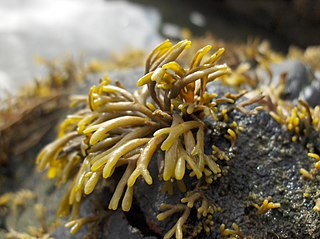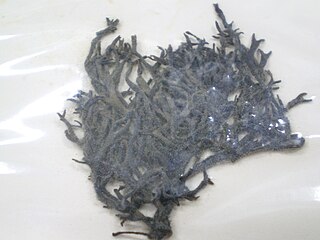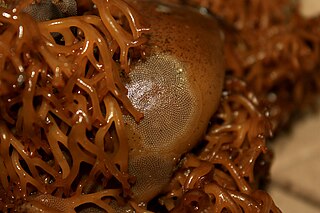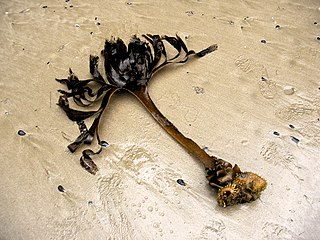
Fucus is a genus of brown algae found in the intertidal zones of rocky seashores almost throughout the world.

Pelvetia canaliculata, the channelled wrack, is a very common brown alga (Phaeophyceae) found on the rocks of the upper shores of Europe. It is the only species remaining in the monotypic genus Pelvetia. In 1999, the other members of this genus were reclassified as Silvetia due to differences of oogonium structure and of nucleic acid sequences of the rDNA.

The Fucales (fucoids) are an order in the brown algae. The list of families in the Fucales, as well as additional taxonomic information on algae, is publicly accessible at Algaebase.

AlgaeBase is a global species database of information on all groups of algae, as well as one group of flowering plants, the sea-grasses.

Ectocarpales is a very large order in the brown algae. The order includes families with pseudoparenchymatous (Splachnidiaceae) or true parenchymatous (Scytosiphonaceae) tissue. Pseudoparenchymatous refers to a filamentous alga with cells packed very close together to give an appearance of parenchymatous tissue, the latter being composed of cells which can truly divide in three dimensions, unusual among the algae. Filamentous algae are composed of cells that divide along a single plane, allowing only elongation to form filaments of one or more rows of cells. Algae that can divide in two planes can form sheet-like thalli or bodies. Cells that can divide in a third plane potentially allow for the organism to develop a more complex body plan, and diversification of body plans into an erect thallus of some sort and a holdfast for attaching the upright portion to the substrate.

Himanthalia elongata is a brown alga in the order Fucales, also known by the common names thongweed, sea thong and sea spaghetti. It is found in the north east Atlantic Ocean and the North Sea.
Nemoderma is the only genus in the family Nemodermataceae and order Nemodermatales of the brown algae. The genus contains only a single species, Nemoderma tingitanum.

Ishigeales is an order of brown algae. It includes two families, Ishigeaceae and Petrodermataceae. The genus Diplura is also included, but not placed to family.

Tilopteridales is an order of brown algae with isomorphic alternation of generations.

Scytothamnales is an order of brown algae.

Ralfsiales is an order of crustose brown algae containing two families.

Dictyotaceae is large family of brown algae. Members of this order generally prefer warmer waters than other brown algae. One genus in this order is calcareous, Padina, the only calcareous member of this class. Lobophora variegata often presents a beautiful blue iridescence due to microscopic bacteria which live on the surface of the blades. A number of genera are known as forkweed (e.g. Dictyota, Glosophora, Dilophus, Dictyopteris, Pachydictyon and Lobospira.

Macrocystis integrifolia is one of four species of kelp in the genus Macrocystis which grows to about 6 metres (20 ft) long.

Ralfsiaceae is a family of brown algae in the order Ralfsiales.

Phyllariaceae is a family of brown algae in the order Tilopteridales.

Scytosiphonaceae is a family of brown algae in the order Ectocarpales.

Sporochnus elsieae is a marine brown algal species in the family Sporochnaceae, endemic to New Zealand. It was first described in 1960 by Victor Lindauer who gave it the specific epithet, elsieae, in honour of his wife, Elsie.
















